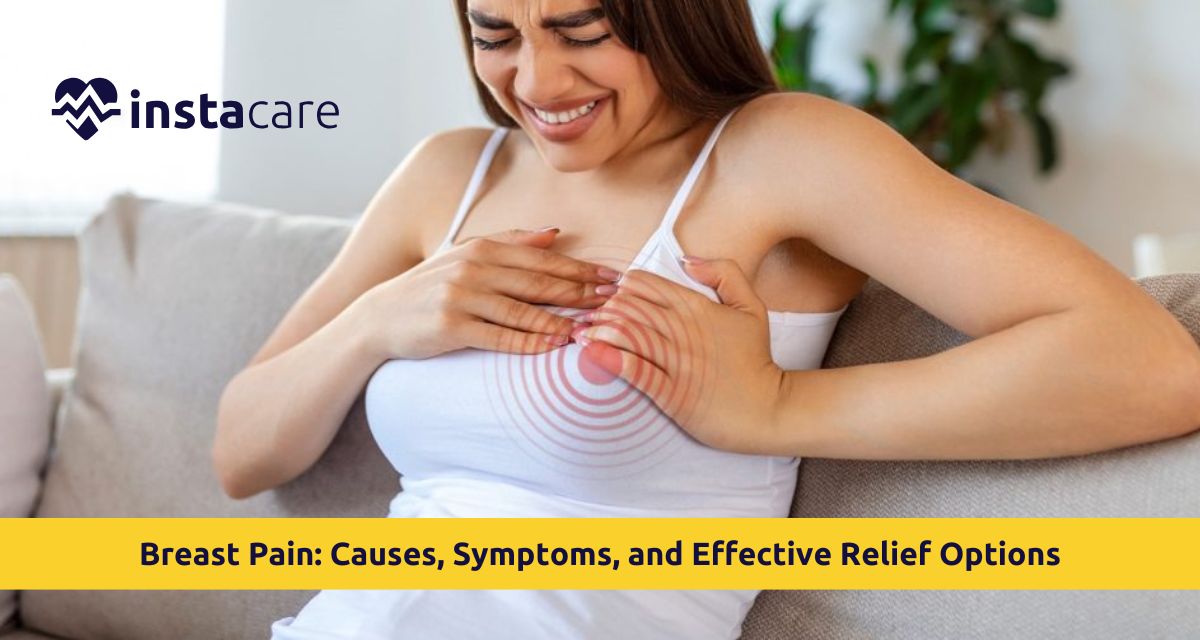What Is Breast Pain?
Common Causes of Breast Pain
- Pregnancy and Lactation: Breast pain during pregnancy is general and more susceptible in the first three months. Breast pain after breastfeeding is produced due to engorgement, milk duct blockage, or mastitis.
- Menopause: Perimenopausal endocrine changes are associated with menstrual cramping and menopause. Breast pain and menopause can be linked as hormone replacement therapy may also be a cause of breast tenderness.
- Causes related to life style: The poorly fitted brassieres, especially during exercise, are likely to be the cause of breast pain. Caffeine, high diet, and certain drugs also lead to pain.
- Breast conditions: Focal pain is caused by benign processes like fibrocystic breast disease, cysts, or fibroadenomas.
Types of Breast Pain
- Cyclical Breast Pain: Cyclical breast pain is a causative condition and is indeed caused by the menstrual cycle and is the most common one. Breast pain before period occurs in both breasts, with more of the outer and upper quadrant, and is a constricting, painful pain with edema. Cyclical breast pain also happens often with aggravating antecedent and before as well as also remits after the menstruation. Cyclical breast pain happens most often between 20-40 years of age in women.
- Non-Cyclical Breast Pain: Non-cyclical breast pain is not related to the menstrual period cycle and can occur at any time. Its pain pattern is breast pain in one breast and not both and can be stinging or burning in nature. It is pain secondary to breast and not chest wall disease or with cancer but an uncommon cause of pain as a presenting symptom.
Symptoms Associated with Breast Pain
- More sensitive than pleasant to touch or painful
- Enlarged or engorged breasts
- Piercing, stabbing, or burning
- Tender and sore pain that is in the armpit or arm
- Pulling, or throbbing quality of pain
- Lumpiness or abnormal breast texture
- Nipple discharge or change
When Should You See a Doctor?
- It persists for more than a few weeks
- Is chronic and interfering with normal activities
- You find a hard mass or thickening
- Nipple discharge test (especially bloody)
- One area or focal tenderness
- Breast skin change
- Fever and tenderness
- If older than 40 years with new breast pain
Read More: Chest Acne 7 Ways to Get Rid of It
Diagnosis of Breast Pain
Effective Treatment and Management
- Lifestyle Modifications: A well-fitting bra is a big help in the prevention of pain, especially with exertion. Cutting back on caffeine and fat intake helps women symptoms. Heat or an ice pack relieves pain immediately.
- Drugs: Over-the-counter pain medication like ibuprofen or acetaminophen also get rid of pain. More cyclical pain can be prescribed by doctors with hormone-stabilizing medicines that regulate levels. Anti-inflammatory creams work as well if applied to the skin.
- Food Supplements: Evening primrose oil, vitamin E, or B6-supplement products have the potential to get rid of breast sensitivity in some studies, but others are undecided.
- Stress Control: As stress increases hormonal fluctuation, relaxation methods, yoga, and proper sleep can help manage the symptoms and how to relieve breast pain.
When Breast Pain Could Indicate Something Serious
- Hard lumpy mass
- Orange-peel skin dimpling
- Nipple inversion
- Heavy bloody nipple discharge
- Sudden weight loss
Living Comfortably With Recurrent Breast Pain
Conclusion

